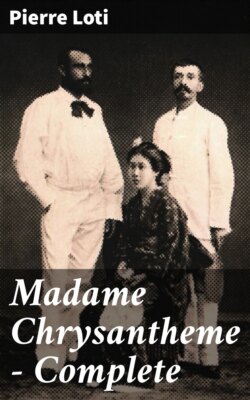Читать книгу Madame Chrysantheme — Complete - Pierre Loti - Страница 4
На сайте Литреса книга снята с продажи.
PIERRE LOTI
ОглавлениеTable of Contents
LOUIS-MARIE-JULIEN VIAUD, “Pierre Loti,” was born in Rochefort, of an old French-Protestant family, January 14, 1850. He was connected with the. French Navy from 1867 to 1900, and is now a retired officer with full captain’s rank. Although of a most energetic character and a veteran of various campaigns—Japan, Tonkin, Senegal, China (1900)—M. Viaud was so timid as a young midshipman that his comrades named him “Loti,” a small Indian flower which seems ever discreetly to hide itself. This is, perhaps, a pleasantry, as elsewhere there is a much more romantic explanation of the word. Suffice it to say that Pierre Loti has been always the nom de plume of M. Viaud.
Lod has no immediate literary ancestor and no pupil worthy of the name. He indulges in a dainty pessimism and is most of all an impressionist, not of the vogue of Zola—although he can be, on occasion, as brutally plain as he—but more in the manner of Victor Hugo, his predecessor, or Alphonse Daudet, his lifelong friend. In Loti’s works, however, pessimism is softened to a musical melancholy; the style is direct; the vocabulary exquisite; the moral situations familiar; the characters not complex. In short, his place is unique, apart from the normal lines of novelistic development.
The vein of Loti is not absolutely new, but is certainly novel. In him it first revealed itself in a receptive sympathy for the rare flood of experiences that his naval life brought on him, experiences which had not fallen to the lot of Bernardin de St. Pierre or Chateaubriand, both of whom he resembles. But neither of those writers possessed Loti’s delicate sensitiveness to exotic nature as it is reflected in the foreign mind and heart. Strange but real worlds he has conjured up for us in most of his works and with means that are, as with all great artists, extremely simple. He may be compared to Kipling and to Stevenson: to Kipling, because he has done for the French seaman something that the Englishman has done for “Tommy Atkins,” although their methods are often more opposed than similar; like Stevenson, he has gone searching for romance in the ends of the earth; like Stevenson, too, he has put into all of his works a style that is never less than dominant and often irresistible. Charm, indeed, is the one fine quality that all his critics, whether friendly or not, acknowledge, and it is one well able to cover, if need be, a multitude of literary sins.
Pierre Loti was elected a member of the French Academy in 1891, succeeding to the chair of Octave Feuillet. Some of his writings are: ‘Aziyade,’ written in 1879; the scene is laid in Constantinople. This was followed by ‘Rarahu,’ a Polynesian idyl (1880; again published under the title Le Mariage de Loti, 1882). ‘Roman d’un Spahi (1881) deals with Algiers. Taton-gaye is a true ‘bete-humaine’, sunk in moral slumber or quivering with ferocious joys. It is in this book that Loti has eclipsed Zola. One of his masterpieces is ‘Mon Freye Yves’ (ocean and Brittany), together with ‘Pecheur d’Islande’ (1886); both translated into German by Elizabeth, Queen of Roumania (Carmen Sylva). In 1884 was published ‘Les trois Dames de la Kasbah,’ relating also to Algiers, and then came ‘Madame Chrysantheme’ (1887), crowned by the Academy. ‘Japoneries d’automne’ (1889), Japanese scenes; then ‘Au Maroc’ (Morocco; 1890). Partly autobiographical are ‘Le Roman d’un Enfant’ (1890) and ‘Le Livre de la Pitie et de la Mort’ (1891). Then followed ‘Fantomes d’Orient (1892), L’Exilee (1893), Le Desert (Syria; 1895), Jerusalem, La Galilee (Palestine; 1895), Pages choisies (1896), Ramuntcho (1897), Reflets sur la Sombre Route’ (1898), and finally ‘Derniers Jours de Pekin’ (1903). Many exquisite pages are to be found in Loti’s work. His composition is now and then somewhat disconnected; the impressions are vague, almost illusory, and the mirage is a little obscure, but the intense and abiding charm of Nature remains. Loti has not again reached the level of Madame Chrysantheme, and English critics at least will have to suspend their judgment for a while. In any event, he has given to the world many great books, and is shrined with the Forty “Immortals.”
ALBERT SOREL
de l’Academie Francaise.
